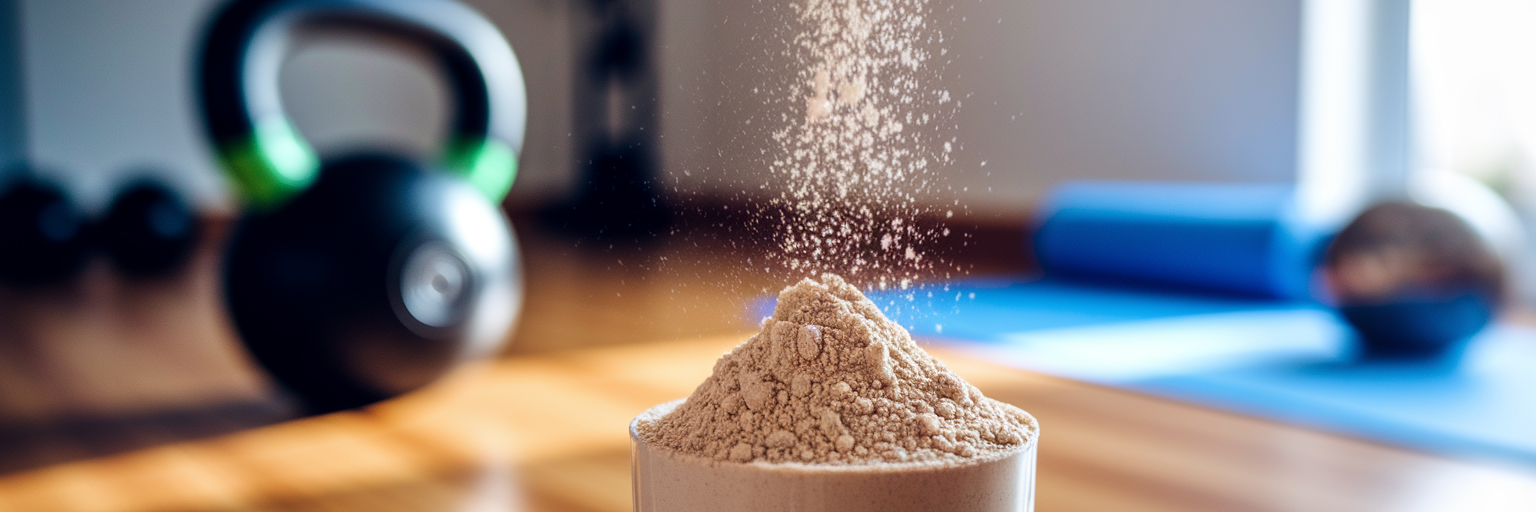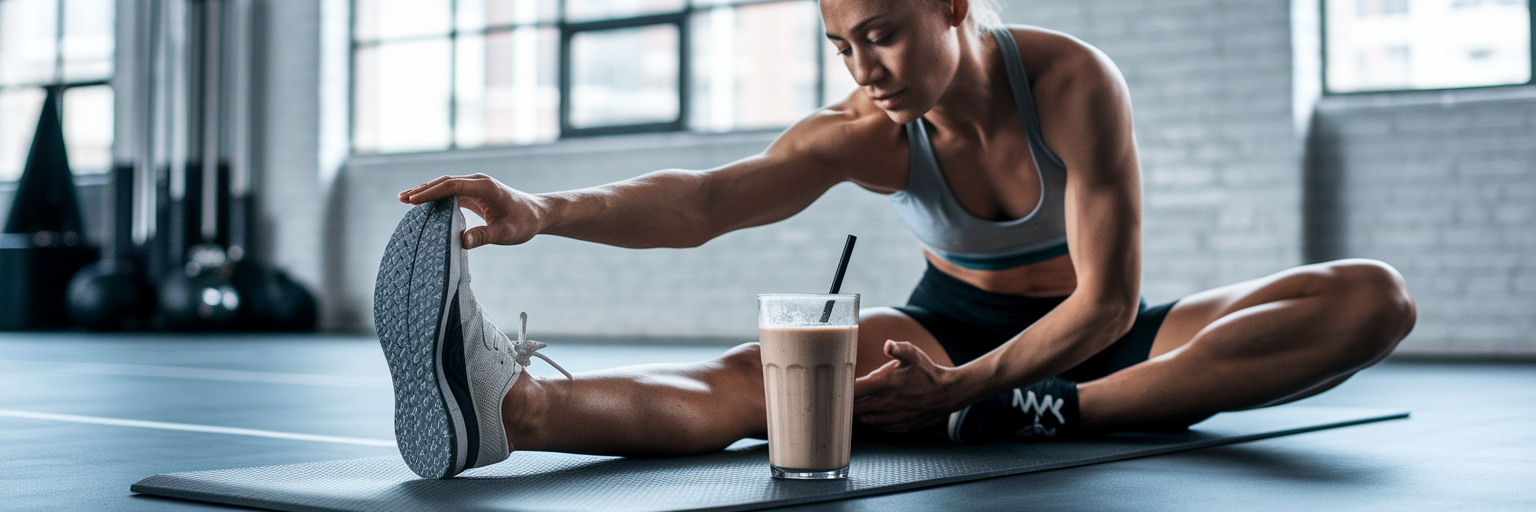What Happens to Your Body After Intense Exercise
We all know that satisfying ache after a tough HIIT session or hitting a new personal best on a lift. That feeling is your body signaling that something important has happened. On a microscopic level, you’ve created tiny tears in your muscle fibers. But don't worry, this isn't damage in a bad way. It's the essential first step your body takes to rebuild and get stronger.
This rebuilding process is called Muscle Protein Synthesis (MPS). Think of it as your body’s dedicated repair crew. This crew is on standby, ready to patch up those muscle fibers. But to do their job, they need the right materials. Their primary raw material? Protein.
When you supply your body with high-quality protein, you’re giving this crew everything it needs to not just repair the muscle, but to build it back even stronger and more resilient than before. This is how you make progress. Your post-workout nutrition is what ultimately determines how successful this repair process is. Without the right fuel, your body can't perform its best work, which is why a quality protein source is non-negotiable for anyone serious about their fitness goals.
The Amino Acid Profile of Plant-Based Proteins

So, we know protein is the key, but what makes a protein effective? It all comes down to its building blocks: amino acids. For muscle repair, a specific group called Branched-Chain Amino Acids (BCAAs) are the most important players. And within that group, one amino acid, leucine, acts as the primary ignition switch that kicks Muscle Protein Synthesis into gear.
There's a common myth that vegan proteins are "incomplete" and therefore less effective. This idea is outdated. While a single plant source might be lower in one or two essential amino acids, modern vegan protein powders solve this by blending complementary sources. For example, combining pea protein (rich in leucine) with rice protein (which has other essential amino acids) creates a complete and powerful profile that rivals any animal-based protein.
The best vegan protein for athletes is one that is specifically formulated to deliver a powerful dose of all essential amino acids, especially leucine. You should look for a powder that provides at least 2.5 to 3 grams of leucine per serving to effectively trigger that muscle-building response. When formulated correctly, plant-based proteins are not a compromise. In fact, as a 2025 study from PubMed indicates, well-formulated plant-based protein sources can significantly support muscle mass and strength, proving they are a formidable tool for recovery.
Fighting Inflammation the Plant-Powered Way
That muscle soreness you feel a day or two after a hard workout, often called DOMS (Delayed Onset Muscle Soreness), is largely caused by inflammation. While this is a natural part of the repair process, managing it can help you recover faster and feel better. This is where you can reduce inflammation with protein from plant sources, which offer a unique advantage.
Unlike their animal-based counterparts, plant proteins are often packed with additional compounds that help your body manage the post-exercise inflammatory response. Here’s how they help you bounce back:
- Natural Antioxidants: Plant sources like pea, hemp, and pumpkin seeds are naturally rich in phytonutrients. These compounds act as antioxidants, helping to combat the oxidative stress that exercise places on your body.
- Faster Bounce-Back: By helping to manage inflammation, these proteins can lead to less severe soreness. This means you feel ready to tackle your next workout sooner, allowing for more consistent training.
- Enhanced Formulations: Many forward-thinking brands now add extra anti-inflammatory ingredients like turmeric or tart cherry extract to their vegan protein powders, giving you an even greater recovery boost in every scoop.
Incorporating these proteins into your routine is simple. Beyond a quick shake, there are plenty of delicious ways to get your daily dose. For some creative ideas, you can find inspiration in these 3 easy vegan protein recipes you'll actually crave.
When to Take Vegan Protein for Optimal Results

For years, the fitness world has talked about the "anabolic window," that 30 to 60-minute period after a workout where you absolutely must have a protein shake. While getting protein in quickly is a great strategy to kick-start recovery, the science has become more nuanced. The current consensus is that your total daily protein intake and how you space it out are even more critical for long-term results.
Think of it less as a single sprint and more as a steady, all-day marathon of fueling your muscles. A recent meta-analysis published in Discovery Journals highlights that while immediate post-exercise protein is beneficial, the overall daily distribution plays a more significant role in muscle recovery. Here’s a simple and effective strategy for timing your vegan protein for muscle recovery:
- Immediately Post-Workout: A shake is perfect here. It’s quickly digested and sends a rapid supply of amino acids to your muscles when they are most receptive.
- Throughout the Day: Don't let your muscles run on empty. Mixing protein powder into your morning oatmeal or a lunchtime smoothie helps maintain a steady supply of amino acids for continuous repair and growth.
- Before Bed: A slow-digesting protein snack or shake before you go to sleep can be incredibly effective. It provides your body with the fuel it needs to continue the repair process overnight while you rest.
How Vegan Protein Compares to Whey for Recovery
The question of vegan versus whey protein often comes up, and it’s helpful to look at it as a choice based on personal goals and preferences, not as a battle of good versus bad. When we compare pea protein vs whey recovery, both are excellent tools, but they work a little differently.
Whey protein is known for its rapid absorption. It delivers a fast spike of amino acids to your muscles, which is great for quickly initiating that MPS response. Plant proteins, on the other hand, often have a more moderate or slower absorption rate. This can be seen as a benefit: a "sustained release" of amino acids that keeps your muscles in a building state for a longer period. Ultimately, studies show that as long as your total protein and leucine targets are met, both are equally effective for building strength and muscle.
The choice often comes down to other factors. Here’s a quick breakdown:
| Factor | Vegan Protein Blends | Whey Protein |
|---|---|---|
| Absorption Speed | Moderate to Slow (Sustained Release) | Very Fast (Rapid Spike) |
| Digestive Friendliness | Generally easier to digest, less bloating | Can cause digestive issues for those with lactose sensitivity |
| Amino Acid Profile | Complete when blended (e.g., pea + rice) | Naturally complete and high in leucine |
| Added Nutrients | Often contains fiber, antioxidants, and micronutrients | Primarily focused on protein content |
| Allergen Profile | Free of dairy, soy-free options available | Contains lactose, a common allergen |
This table summarizes the key differences to help you choose based on your personal goals, dietary needs, and how your body feels. If you're curious about how different proteins stack up, you can read our guide on the best protein powders to find the right fit for you.
Choosing the Right Vegan Protein for Your Goals
Feeling ready to give plant-powered recovery a try? Choosing the right product doesn't have to be complicated. Here is a simple checklist to help you read the label and make a confident choice:
- Look for a blend of multiple plant sources, like pea, rice, or hemp, to ensure you're getting a complete amino acid profile.
- Check for at least 20-25 grams of protein per serving to effectively fuel muscle repair.
- Opt for a powder with minimal added sugars and no unnecessary artificial ingredients. Your body deserves clean fuel.
Remember, the best plant based protein after workout is the one you genuinely enjoy and will use consistently. Don't be afraid to experiment with a few different brands or flavors to find your favorite. Ready to fuel your recovery the plant-powered way? Explore our full collection of high-quality vegan supplements to find your perfect match.



